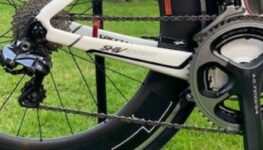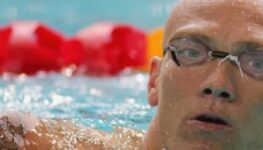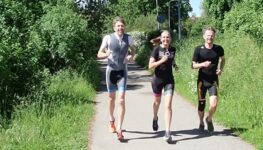A philosophy for fighting and everyday life
Cus D’Amato philosophy
The philosophy of this legendary coach is almost identical to that of other legendary sports coaches. Due to generational differences, sporting backgrounds, availability of material, etc, we seriously doubt that any of the legends ever met, or even knew of each other’s existence!
It really is funny how all these legends arrive to similar assessments of human characteristics and how to best nurture individuals to become world champion athletes.
This week’s resource is a video on YouTube, a composite of video and audio interviews of Cus D’Amato.
Cus was a legendary boxing coach and manager, best known for his mentorship, coaching and father figure role in Mike Tyson’s early life as a boxer. He also coached Floyd Patterson (2 x heavyweight champion) and José Torres (silver medallist at the 1956 Olympics and light heavyweight champion).
Mike and Cus were introduced when Mike was released from juvenile prison at the age of 13. Cus had pretty much retired from professional coaching and had opened a boxing gym focused on giving under privilege “kids” a place to go, to learn a skill and learn discipline. Mike joined the gym and was guided by Cus, who coaching him in the way of boxing and making him focus on and dedicate his energy to the sport instead of crime.
Cus saw something special in Mike and returned from retirement! Cus coached a unique boxing style, “peek-a-boo”, which was unorthodox (against the norm) and difficult to learn but proved HIGHLY effective. Alongside coaching this unique and untraditional fighting style, Cus was also a master of training the mind – building resilience and awareness, so that focus and control could be retained when in a fight.
What is now termed “mental toughness”, he called “character”.
Character (00:00)
Character = your mental outlook (are you positive or negative?), mental toughness and decision making under pressure
Character outperforms pure talent, combine skill (talent) and character and you have a great athlete!
We don’t dictate what you do, like Cus we try to figure out what makes your “tick”, what your strengths and weaknesses are and then adapt training and coaching cues to “fuel your fire” and performance.
Build your character with every experience you have ever had “we are today a sum total of what we’ve been – every act and every deed we’ve had makes us who we are today – good or bad”
You aren’t limited by your experiences and bound to repeat them; bad actions and experiences are learning curves, use them to correct future events.
Filter through your layers of ego, pride and self-protection until you find what really lies beneath… only then can you work on strengthening your character.
All the physical training fuels your character, if you are aware of its purpose – train mindlessly, not engaging with the processes, your actions and feelings will have less influence on fight (race) day. Stay focused on your training and it will build your confidence and your state of readiness will be elevated.
Belief (3:39)
What kind of belief do you have in yourself? A belief that stems from others (forced belief)or a belief that comes from within? There is a difference – others may believe in you and tell you you are great, but YOU may not genuinely believe it. If the belief comes from within, from all your past experiences, even if others doubt your ability, then this is true belief and confidence!
Belief helps you reach your potential sooner, having a talent or working at a skill will eventually get better, but believing in yourself and the training will accelerate your development.
Want to reach your goals? Hold a professional mindset – even though you are all “amateur” athletes. Have the discipline to train, to do what is needed to be done (training, eating, sleeping, etc) and continue believing in you and the training. An individual that gets the work done in good times and bad times will succeed.
We can all learn from other athletes; we can observe them and apply methods to perfect ourselves. Observing mistakes and weaknesses in their performances to learn from their mistakes, rather than copying what they say to be a strength – for examples: swim movements, cycling cadence and positioning, running movements, eating and drinking sources, etc. A lot of our approach is different to the normal ways of coaching, because we have LEARNT that the normal way is weak / inefficient!
Environment (8:06)
Set up your environment to help you succeed. You may not be living in poverty and crime areas and likely to become criminals (!), but you are surrounded by influences that can benefit or hinder your development. Prepare your home, equipment, food, social circles so that you have the best chance of doing what needs to be done to become the best version of yourself! Don’t let people or lack of preparation or breaks of routine distract you from your hobby and your goals.
You have control of your life and your performance, others do not, you can choose to prepare your life in a way that benefits you.
Interest and Enthusiasm (10:44)
Triathlon is your hobby, your interest, your passion. If you keep it this way you will progress quicker, if the balance between life and training faulters, so will your enjoyment for the sport.
Watch and learn from the great past athletes and coaches, what they did back then, with the (lack of) resources and science they had at the time, and how far they reached and succeeded. Learn from them – their strengths and weaknesses. These are the athletes and coaches that had to figure things out and did so through feel, trial and error, and initiative, not science and technology (which as you should all be realising is often inaccurate, glitchy and not adaptable to the athlete and day).
Mike had the drive and interest to research the older fighters, reading and watching and comparing the approach and lifestyles of fighters from the 1910-1960’s to the way things are for him in the 80’s. He notes that life in the 80’s has more distractions than those from earlier times – what about now!!! All the distractions we have…
Developing the mindset of a champion
There are very few new experiences in sport, the chances of experiencing something new is slim. “Profit from the experience of the older guys”, learn from their mistakes – save yourself the pain and suffering!
Put yourself in the mind of a champion, what qualities and processes would that individual have that you need to work on? The awareness of their actions, the discipline, the preparation, the recovery, etc, etc. Once identified, figure out how to improve and stick with these processes.
If you have the will and discipline, believe in yourself, your training and your goals, and get the processes in place every day, you are setting yourself up to succeed! When you succeed, it is fuel for further progression.
Perfection doesn’t exist! Once you reach your perceived perfections, you can exceed it, so there is no perfection – we can always do better… “I don’t believe in perfection at all, as such! It’s a continuing factor, it’s a relative point that once he reaches it, he was able to see further ahead than he was able to see before he reached that point”
Dreams (15:10)
Dreams keep you going, dreams give you purpose – but what is yours? Dreams aren’t just about being a champion, for some of the kids in the Cus’s gym it was just being part of something, being somewhere safe and getting the attention they weren’t getting elsewhere.
Dreams need to be used to fuel your future actions, if you really want to reach your dreams you do have to work for them, use them to motivate you and know that sacrifices are needed to get you to where you want to be.
Working towards your dream can be hard at times, it takes commitment and discomfort. No one ever reached their goals without working for it, and only you truly know what was sacrificed; other may have a glimpse, but they don’t know what you felt and conquered.
Training is the hard part, training day in and day out is not always “fun”, its still your hobby and passion, but sometimes training is hard, and you might not be in the right mindset. Get the job done though, commit to it, and you will gain new levels of character, you will be tougher and one step closer to your goal.
Learn and accept the process laid down in front of you, the training is something you have to do if you want to succeed. Follow these processes and enjoy them, they will get you the outcome you want.
Training and racing (and life) is sometimes challenging, with occurrences that you haven’t experienced before. You can either take on the challenge or avoid it…
Honing a skill happens over many, many repetitions – days, weeks, months and years! Every training session and race is an opportunity to learn, assess and adapt your skills, you just have to stay aware and in the moment.
Don’t let the challenges in training, racing or life put you down, stay focused on you development and realise the challenge will benefit you if you rise to it.
Fear (19:57)
What are your fears, what layers of protection and resistance have you laid in an attempt to resist and prevent your fear from happening?
Fear is not a bad thing; fear is like fire. If you learn how to use fear it can light your way to success, but if you don’t use it properly, it will burn you, prevent you from reaching your potential.
Fear is a safety mechanism, without fear we wouldn’t be where we are no as a species. Without fear we’d take too many risks and do too many stupid things that sabotages our progress.
Dealing with your fear, facing it, allows you to progress and gain experience.
Heroes and cowards, there is nothing different about them, just how they act and control their fear. One has the discipline to face the fear, while one avoids facing it. The hero (a role model within our sport) acts against the instinct of shying away or giving up, while the coward quits or doesn’t turn up.
Anxiety (24:54)
The hardest part of competing (fighting for Mike) is the waiting. When the race starts, you get in the zone, it’s the acute build up that is the hard part; the few days before the event that nerves build and doubt can set in.
Everyone experiences anxiety and doubt (fears the upcoming episode), those that have the discipline and confidence in their training and ability can control themselves – they become their own hero. They don’t back away or react to their negative thoughts.
“Motion relieves tension” Teddy Atlas, Mike’s boxing trainer. Keep active leading up to the event, keep moving to keep your body loose and keep your mind focused on movements needed race day. Small doses of swim, bike and run in the days before the event help keep you calm and in tune with your body.
Positive self-talk, accepting your fears, recalling all your training and hard work building up to this point. Objectively assess your preparation and what your fears are, review all the positive things you have done, and know what you have to do on the day to benefit yourself – adapting and overcoming anything that presents itself
If you weren’t anxious, there’d be something wrong with you or you are underestimating you ability and the race at hand!
A calm mind can process events effectively, a panicked and negative mind cannot. Worrying about the things that might happen (that might NOT happen) expends too much energy and focus. Know things might happen, rehearse how you’d deal with them in training – NOT in the days leading up to and on race day, do it in advance!
If things go wrong (goggle leak, puncture, loss of water bottle, etc) your best way of overcoming the incident is to be calm, slowly go through the processes you have practiced or visualised in training. If you panic or get frustrated or become self-loathing, your ability to deal with the issue becomes compromised, rushed, flustered and slow.
Conclusion
Character (mental toughness) is the final piece, and most valuable piece, of the recipe when it comes to athletic success. All the training in the world will not help you if you don’t have the right mindset, discipline, control and belief to harness it.
Know that everything you experience, others have (and will) experience too. How you control your experiences and learn from them will prove to be your strength or your weakness.
Training at home, in your pain caves, in the gyms, in the pools, outdoors in the rain, wherever, is enough for you to build your ability and confidence for race day. Use your experiences to fight and overcome the challenges you have set yourself, anything else that occurs, you can overcome that too, if you want to and are calm enough to.



